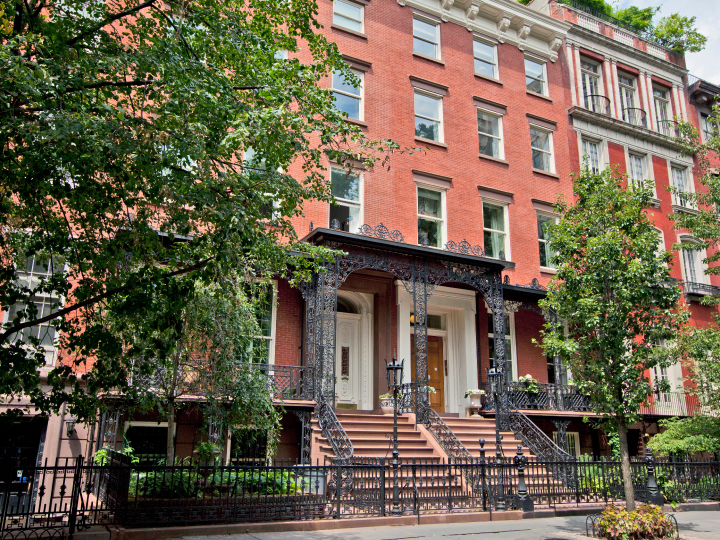The Changing Landscape of Multifamily Commercial Real Estate
November 13, 2023
Written by Ryan Newberry | VP/Commercial Loan Officer
New York City has always been a consistent source of business for Kearny Bank, but we're now seeing some fundamental changes which landlords need to be aware of.
Over the years we have provided many multifamily real estate loans for the purchase and refinance of multifamily apartment buildings. Those buildings are filled with apartments that are free market, rent stabilized or rent controlled. For years, that was not a problem. Now, given a 2019 law, aging buildings and rising interest rates, that has changed. Numerous landlords have had to sell their rent stabilized buildings for a fraction of what they were worth a few years ago and banks are foreclosing on many rent stabilized buildings. For example, on August 3, 2023, The Real Deal reported that New York Community Bank, the largest lender to rent stabilized buildings, was foreclosing on 8 buildings in New York.
Why has this happened? Here are the key factors and how this affects bank lending.
The 2019 Rent Law
In 2019 New York passed the Housing Stability & Tenant Protection Act. This law limited landlords’ ability to increase annual rental income on rent-stabilized apartments. As noted in Mayor de Blasio’s 2016 Ten-Year Housing Plan, several key areas were affected including Major Capital Improvements (MCIs), Individual Apartment Improvements (IAIs) and High Rent/High Income Decontrol. A landlord’s ability to raise rents after performing MCIs or IAIs is now severely limited, and according to the New York State Office of Rent Administration, apartments can no longer be removed from rent stabilization because their rents exceed a certain amount or the tenant’s income rises above a certain amount. These changes to the rent law make it very difficult for a landlord to increase rents in a rent-stabilized apartment beyond normal annual rental increases which are set by the Rent Guidelines Board.
Aging Buildings, Higher Maintenance Costs and Rising Expenses
Many of the properties for which we provide mortgage financing in NYC are over 100 years old. Some buildings were constructed pre-1900. As one can imagine, this requires frequent upkeep and capital improvement. However, without consistent rental increases it makes it harder for landlords to find the capital needed to invest into their buildings. Further, real estate taxes, utility costs and insurance have continued to rise with no increases in revenue to offset.
Higher Interest Rates
The Federal Reserve has raised their target interest rate multiple times since the beginning of 2022 in the hope of wrenching down inflation. At the beginning of 2022 market rates for commercial multifamily loans were +/- 3.50% for 5 years. As of today, rates are +/- 7.00%. This dramatic increase in interest rates impacts loan proceeds, credit standards and property values. This interest rate shock is especially felt in 5 year loans that were funded in 2018 at rates between 3.50%-4.00% and are either maturing or rate-resetting in 2023. Borrowers are forced to either pay down existing loan balances, seek alternative financing or sell.
Effect on Bank Lending
These factors have caused banks to take a more cautious approach with rent stabilized assets. Loan proceeds are down, credit standards are up, the belts are tightening. And we are seeing pockets of rent control appear in New Jersey. It was reported on October 23, 2023 in The Real Deal that 155 Washington Street and 100 Warren Street, both in Jersey City, are subject to rent control. Certainly, an issue to watch; however, there is no law in New Jersey similar to the 2019 Rent Law in New York. Rent Control laws are more localized in New Jersey such as in Jersey City and in certain municipalities such as Orange.
Despite the issues with rent stabilization, buildings with free market apartment units (units not subject to rent stabilization or rent control) are faring better. With free market rental units, landlords have more capital to invest in building-wide improvements and property cash flows better support credit metrics and property values. In fact, most apartment buildings in New Jersey are fully free market.
What Can Borrowers Do?
Talk to your loan officer. Having an honest conversation with your bank representative will go a long way. We are always available to listen to borrowers issues and try and find a solution - whether the solution is a fresh equity investment, paying down existing debt, seeking alternative financing, or selling. There are options available and talking to your loan officer can help.
About Ryan:

Ryan Newberry is focused on commercial real estate lending activities throughout our home state of New Jersey, as well as in New York, Pennsylvania, Connecticut, Delaware and Maryland. This entails reviewing and writing loans on multifamily, mixed use, retail and industrial projects across our market area and managing client relationships for Kearny Bank. Ryan has held various commercial lending positions related to real estate finance during his career, and immediately prior to joining Kearny Bank was Vice President & Associate Managing Director at Sterling National Bank. He holds an MBA with a concentration in Financial Management from Iona University, and a bachelor’s from the University of Massachusetts. Ryan currently resides in Bergen County with his wife and newborn son.
Contact Ryan to learn more




